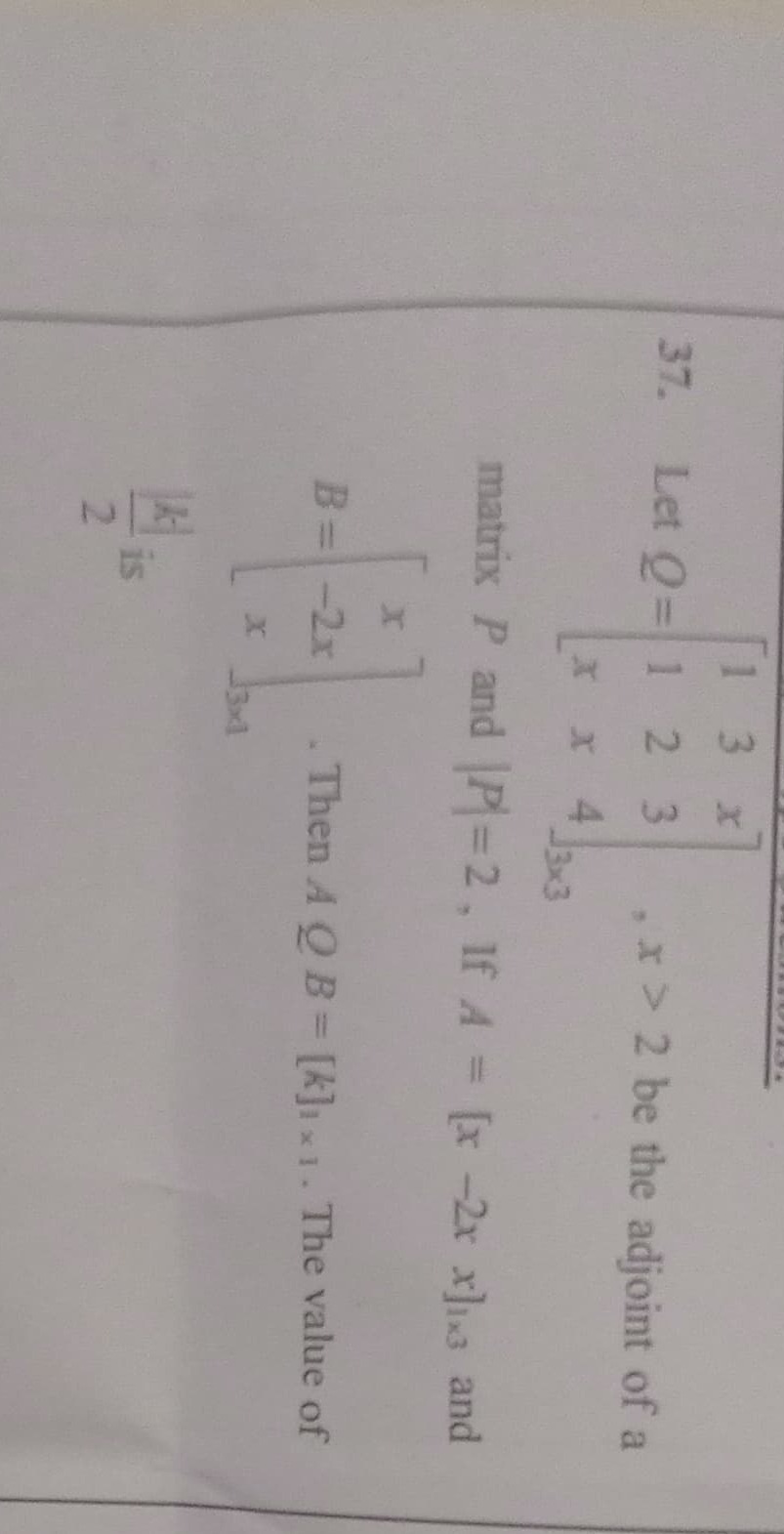Question
Question: Let $Q = \begin{bmatrix} 1 & 3 & x \\ x & 2 & 3 \\ x & x & 4 \end{bmatrix}_{3x3}$, $x > 2$ be the ad...
Let Q=1xx32xx343x3, x>2 be the adjoint of a matrix P and ∣P∣=2, If A=[x −2x x]1x3 and B=x−2xx3x1. Then AQB=[k]1x1. The value of 2∣k∣ is

17 + 12√2
Solution
The problem involves properties of adjoint matrices and matrix multiplication.
-
Find the determinant of Q in terms of x: Given Q=1xx32xx34. The determinant of Q is: ∣Q∣=1(2×4−3×x)−3(x×4−3×x)+x(x×x−2×x) ∣Q∣=1(8−3x)−3(4x−3x)+x(x2−2x) ∣Q∣=8−3x−3x+x3−2x2 ∣Q∣=x3−2x2−6x+8
-
Use the property of adjoint matrix determinant: We are given that Q=adj(P) and P is a 3×3 matrix (since Q is 3×3). For an n×n matrix P, we have ∣adj(P)∣=∣P∣n−1. In this case, n=3, so ∣Q∣=∣adj(P)∣=∣P∣3−1=∣P∣2. Given ∣P∣=2, we have ∣Q∣=22=4.
-
Solve for x: Equating the two expressions for ∣Q∣: x3−2x2−6x+8=4 x3−2x2−6x+4=0 We look for roots of this cubic equation. Testing integer factors of 4, we find that x=−2 is a root: (−2)3−2(−2)2−6(−2)+4=−8−8+12+4=0. Since (x+2) is a factor, we perform polynomial division: (x3−2x2−6x+4)÷(x+2)=x2−4x+2. So, the equation becomes (x+2)(x2−4x+2)=0. The roots are x=−2 or x2−4x+2=0. Using the quadratic formula for x2−4x+2=0: x=2(1)−(−4)±(−4)2−4(1)(2)=24±16−8=24±8=24±22=2±2. We have three possible values for x: −2, 2+2, 2−2. The problem states x>2. 2+2≈2+1.414=3.414, which satisfies x>2. 2−2≈2−1.414=0.586, which does not satisfy x>2. Therefore, x=2+2.
-
Calculate AQB: We are given A=[x −2x x] and B=x−2xx. First, calculate AQ: AQ=[x −2x x]1xx32xx34 AQ=[(x)(1)+(−2x)(x)+(x)(x)(x)(3)+(−2x)(2)+(x)(x)(x)(x)+(−2x)(3)+(x)(4)] AQ=[x−2x2+x23x−4x+x2x2−6x+4x] AQ=[−x2+xx2−xx2−2x]
Now, calculate (AQ)B: k=[−x2+xx2−xx2−2x]x−2xx k=(−x2+x)(x)+(x2−x)(−2x)+(x2−2x)(x) k=−x3+x2−2x3+2x2+x3−2x2 k=(−x3−2x3+x3)+(x2+2x2−2x2) k=−2x3+x2
-
Substitute the value of x and simplify k: From the cubic equation x3−2x2−6x+4=0, we can write x3=2x2+6x−4. Substitute this into the expression for k: k=−2(2x2+6x−4)+x2 k=−4x2−12x+8+x2 k=−3x2−12x+8
Now, substitute x=2+2: x2=(2+2)2=22+2(2)2+(2)2=4+42+2=6+42.
k=−3(6+42)−12(2+2)+8 k=−18−122−24−122+8 k=(−18−24+8)+(−122−122) k=−34−242
-
Calculate 2∣k∣: ∣k∣=∣−34−242∣=∣−(34+242)∣=34+242. 2∣k∣=234+242=17+122.
The final answer is 17+122.
